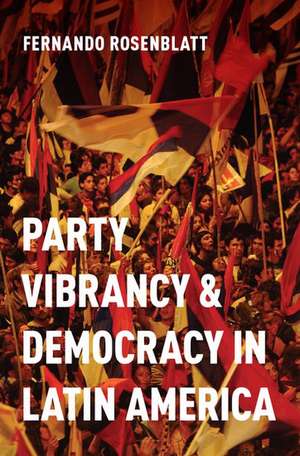Party Vibrancy and Democracy in Latin America
Autor Fernando Rosenblatten Limba Engleză Hardback – 7 iun 2018
| Toate formatele și edițiile | Preț | Express |
|---|---|---|
| Paperback (1) | 168.05 lei 10-16 zile | |
| Oxford University Press – 5 oct 2021 | 168.05 lei 10-16 zile | |
| Hardback (1) | 534.53 lei 31-37 zile | |
| Oxford University Press – 7 iun 2018 | 534.53 lei 31-37 zile |
Preț: 534.53 lei
Preț vechi: 714.68 lei
-25% Nou
Puncte Express: 802
Preț estimativ în valută:
102.30€ • 106.40$ • 84.45£
102.30€ • 106.40$ • 84.45£
Carte tipărită la comandă
Livrare economică 02-08 aprilie
Preluare comenzi: 021 569.72.76
Specificații
ISBN-13: 9780190870041
ISBN-10: 0190870044
Pagini: 304
Ilustrații: 1 line drawing, 56 boxes, and 3 tables
Dimensiuni: 236 x 160 x 31 mm
Greutate: 0.54 kg
Editura: Oxford University Press
Colecția OUP USA
Locul publicării:New York, United States
ISBN-10: 0190870044
Pagini: 304
Ilustrații: 1 line drawing, 56 boxes, and 3 tables
Dimensiuni: 236 x 160 x 31 mm
Greutate: 0.54 kg
Editura: Oxford University Press
Colecția OUP USA
Locul publicării:New York, United States
Recenzii
Political parties are an integral part of most political systems. Rosenblatt conducted extensive interviews from 2010 to 2014 with many political activists in Chile, Costa Rica, and Uruguay, three of Latin America's currently most stable democracies. He attributes the stability of these regimes to "party vibrancy," acondition based on party institutionalization not tied to a particular candidate or factor... Despite many challenges, parties in Chile, Costa Rica, and Uruguay have survived as significant channels of democratic representation and served their nations well.While drawing the examples from Latin America, Rosenblatt's conclusions are broadly applicable to political parties anywhere in the world. The book belongs in all academic libraries.
Notă biografică
Fernando Rosenblatt is an Associate Professor at the Universidad Diego Portales, Chile. He studies party organizations and party activism in Latin America. He has published in Perspectives on Politics, Comparative Political Studies, Party Politics, Governance, Latin American Politics and Society, Latin American Research Review, Democratization, Política y Gobierno, and Revista de Ciencia Política. In collaboration with Verónica Pérez and Rafael Piñeiro, he coauthored How Party Activism Survives: Uruguay´ s Frente Amplio (2020).
